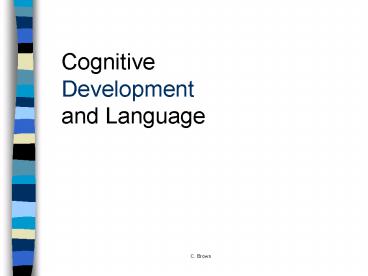Cognitive Development and Language - PowerPoint PPT Presentation
1 / 36
Title:
Cognitive Development and Language
Description:
If I like it, it's mine. If it's in my hand, it's mine. If ... Overlooks influence of cultural and social groups. C. Brown. Vygotsky's Sociocultural Perspective ... – PowerPoint PPT presentation
Number of Views:2435
Avg rating:5.0/5.0
Title: Cognitive Development and Language
1
CognitiveDevelopmentand Language
2
Overview
- Definition of Development
- Piagets Theory of Cognitive Development
- Implications of Piagets Theory
- Vygotskys Sociocultural Perspective
- Implications of Vygotskys Theory
- Development of Language
3
Concept Map
Language Development
Development Defined
Cognitive Development and Language
Vygotskys Theory and Implications
Piagets Theory and Implications
4
Types of Developmental Change
- Physical
- Personal
- Social
- Cognitive
5
Principles of Development
- Rates differ
- Orderly
- Gradual
6
Brain Development
- Main structures
- Specialization and integration
- Lateralization
- Storing and transferring information
7
(No Transcript)
8
Brain Based Learning
- Sousa Video
- Handout
9
Piagets Theory of Cognitive Development
- Maturation
- Activity
- Social transmission
- Equilibration
- Mnemonic MASE
10
Basic Tendencies in Thinking
- Organization
- Schemes / schema
- Adaptation
- Assimilation
- Accommodation
- Resistance???
- Equilibration
- Equilibrium
- Disequilibrium
11
Piagets Stages of Cognitive Development
- Sensorimotor
- Pre-operational
- Concrete operations
- Formal operations
12
Sensorimotor Stage 02
- Learning through 5 senses
- Object permanence
- Goal directed actions
13
Rules for Toddlers
- If I like it, its mine.
- If its in my hand, its mine.
- If I can take it from you, its mine.
- If I had it a little while ago, its mine.
- If its mine, it must never appear to be yours in
any way.
14
Rules for Toddlers, continued
- If Im doing or building something, all the
pieces are mine. - If it looks like mine, its mine.
- If I saw it first, its mine.
- If you are playing with something, and you put it
down, it automatically becomes mine. - If its broken,
its yours!
15
Preoperational Stage 27
- Operations
- Semiotic function
- One-way logic
- Difficulty with centering conservation
- Egocentrism
- Language develops
16
(No Transcript)
17
Concrete Operational StageAges 711
- Hands on thinking
- Conservation, identity, compensation
- Reversibility
- Classification
- Seriation
18
Formal Operational StageAges 1115
- Not all individuals reach this stage
- Hypothetico-deductive reasoning
- Scientific reasoning
- Adolescent egocentrism imaginary audience
19
Implications of Piagets Theory for Teachers
- Understanding students thinking
- Match teaching to cognitive stage
- Presentation strategies
- Illustrations and examples
- Assignments
- Use disequilibrium to motivate
- Individuals construct knowledge
- Use disequilibrium to motivate
- See Guidelines, Woolfolk pp. 35, 37, 40
20
Limitations of Piaget
- Stage theory inconsistencies
- Underestimating children's abilities
- Cognitive development information processing
- Overlooks influence of cultural and social groups
21
Vygotskys Sociocultural Perspective
- Knowledge is co-constructed
- Interpsychological and Intrapsychological
- Social interactions
- Role of cultural tools
- Role of language private speech
- Self-talk learning
- Role of adults and peers
22
Private Speech Piaget versus Vygotsky
23
Implications of Vygotskys Theory for Teachers
- Assisted learning
- Scaffolding
- Zone of proximal development
- Collaborative learning
- Alternative assessment
- See Guidelines, Woolfolk, p. 53
24
Reflection Questions
- Compare Piaget with Vygotsky regarding
implications for teaching. - Compare disequilibrium with the zone of proximal
development. - Compare the role of social transmission in
Piagets and Vygotskys theories.
25
Language Development
- Reinforced behaviors or special capacity for
language learning? - Influences of heredity and environment
26
Language DevelopmentThe School Years
- Pronunciation
- Syntax
- Vocabulary meaning
- Metalinguistic awareness
27
Summary
- Definition of Development
- Piagets Theory of Cognitive Development
- Implications of Piagets Theory
- Vygotsky Sociocultural Perspective
- Implications of Vygotskys Theory
- Development of Language
28
Review Questions
- What are three principles of development?
- What part of the brain is associated with higher
mental functions? - What is lateralization and why is it important?
- What are the main influences on cognitive
development? - What is a scheme?
29
Review Questions
- As children move through Piagets four stages,
what are the major changes? - What is the problem of the match?
- What is active learning? Why is Piagets theory
consistent with active learning? - What are some limitations of Piagets theory?
- Explain how interpsychological development
becomes intrapsychological development.
30
Review Questions
- What are the differences between Piagets and
Vygotskys view of private speech and its role in
development? - What is assisted learning? Scaffolding?
- What is a students zone of proximal development?
- How are humans predisposed to develop language?
What role does learning play? - Describe teacher actions and responses that
encourage language development.
31
Compare Contrast Piagets and Vygotskys
Theories.
32
Short Answer
- When a child can focus on both width and length
of two triangles in order to compare their areas,
Piaget would say that the child is capable of
_________________.
33
Short Answer
- When a child can focus on both width and length
of two triangles in order to compare their areas,
Piaget would say that the child is capable of
decentering.
34
Multiple Choice
- According to Vygotsky, which of the following
would be most influential on a childs learning? - a. Social transmission
- b. Cognitive level
- c. Repetition of information
- d. Maturation
35
Multiple Choice
- According to Vygotsky, which of the following
would be most influential on a childs learning? - a. Social transmission
- b. Cognitive level
- c. Repetition of information
- d. Maturation
36
Mnemonics How Will You Remember...
- Piagets influences on development?
- Piagets four stages?
- The zone of proximal development?































